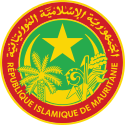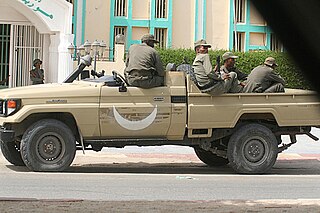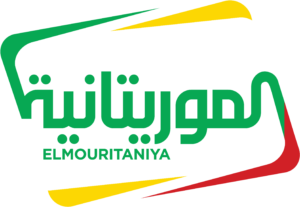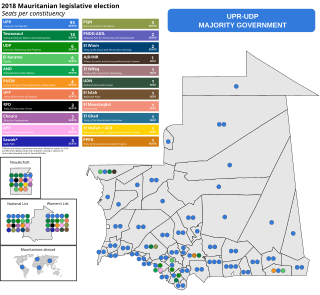 |
|---|
|
Elections to the French National Assembly were held in Mauritania on 2 January 1956. Mauritania had one seat in the Assembly, which was won by Sidi el-Mokhtar N'Diaye, a member of the Mauritanian Progressive Union. [1]
 |
|---|
|
Elections to the French National Assembly were held in Mauritania on 2 January 1956. Mauritania had one seat in the Assembly, which was won by Sidi el-Mokhtar N'Diaye, a member of the Mauritanian Progressive Union. [1]
| Candidate | Party | Votes | % | |
|---|---|---|---|---|
| Sidi el-Mokhtar N'Diaye | Mauritanian Progressive Union | 106,603 | 85.58 | |
| Horma Ould Babana | Mauritanian Entente | 17,371 | 13.95 | |
| Ould Jiddou | Independent | 585 | 0.47 | |
| Total | 124,559 | 100.00 | ||
| Valid votes | 124,559 | 97.71 | ||
| Invalid/blank votes | 2,921 | 2.29 | ||
| Total votes | 127,480 | 100.00 | ||
| Registered voters/turnout | 217,717 | 58.55 | ||
| Source: De Benoist, [2] Sternberger et al. [3] | ||||

French West Africa was a federation of eight French colonial territories in West Africa: Mauritania, Senegal, French Sudan, French Guinea, Ivory Coast, Upper Volta, Dahomey and Niger. The federation existed from 1895 until 1958. Its capital was Saint-Louis in Senegal until 1902, and then Dakar until the federation's collapse in 1960.

The flag of Mauritania is a green field containing a gold star and crescent, with two red stripes at the top and bottom of the field. The original national flag was introduced under the instructions of President Moktar Ould Daddah and the constitution of 22 March 1959 and was officially adopted on 1 April 1959.
The National anthem of Mauritania, also known by its incipit, "Bilāda l-ʾubāti l-hudāti l-kirām", was officially adopted on 28 November 2017 and was composed by Egyptian composer Rageh Daoud.

Elections in Mauritania encompass four different types: presidential elections, parliamentary elections, regional elections and local elections.

The Madrid Accords, formally the Declaration of Principles on Western Sahara, was a treaty between Spain, Morocco, and Mauritania setting out six principles which would end the Spanish presence in the territory of Spanish Sahara and arrange a temporary administration in the area pending a referendum.

The National Assembly is the unicameral legislative house of the Parliament of Mauritania. The legislature currently has 176 members, elected for five-year terms in electoral districts or nationwide proportional lists.

The Mauritanian Parliament (Barlamane/Parlement) is composed of a single chamber, the National Assembly. Composed of 176 members, representatives are elected for a five-year term in single-seat constituencies.

Slavery has been called "deeply rooted" in the structure of the Northwestern African country of Mauritania and "closely tied" to the ethnic composition of the country, despite the cessation of slavery across other African countries and a ban on the practice by colonial owners in 1905.

The following outline is provided as an overview of and topical guide to Mauritania:

The current Constitution of Mauritania was adopted on 12 July 1991. There have been several constitutions since Mauritania's independence in 1960.

The period from the mid-nineteenth to mid-twentieth centuries is the colonial period in Mauritania.

The 2008 Mauritanian coup d'état was a military coup that took place in Mauritania on August 6, 2008, when President Sidi Ould Cheikh Abdallahi was ousted from power by the Armed Forces of Mauritania, led by a group of high-ranking generals he had dismissed from office earlier that day.

Mauritania, officially the Islamic Republic of Mauritania, is a sovereign country in Northwest Africa. It is bordered by the Atlantic Ocean to the west, Western Sahara to the north and northwest, Algeria to the northeast, Mali to the east and southeast, and Senegal to the southwest. By land area, Mauritania is the 11th-largest country in Africa and the 28th-largest in the world, and 90% of its territory is situated in the Sahara. Most of its population of approximately 4.3 million lives in the temperate south of the country, with roughly one-third concentrated in the capital and largest city, Nouakchott, located on the Atlantic coast.

The Television of Mauritania is Mauritania's national state-owned public service television broadcaster.

Elections to the French National Assembly were held in Mauritania on 17 June 1951. Mauritania had one seat in the Assembly, which was won by Sidi el-Mokhtar N'Diaye, a member of the Mauritanian Progressive Union. He defeated the incumbent, Horma Ould Babana, who had been elected as a member of the French Section of the Workers' International in the last election, but had since gone on to leave the SFIO and form his own party, the Mauritanian Entente.

Sawab, is a Ba'athist and Arab nationalist political party in Mauritania. The party leader is Abdesselam Ould Horma.

Territorial Assembly elections were held in Mauritania on 30 March 1952. The result was a victory for the Mauritanian Progressive Union, which won 22 of the 24 seats.

Parliamentary elections were held in Mauritania in September 2018; the first round took place on 1 September, with a second round held on 15 September. At the national level, elections were held in 157 constituencies, each electing one member to the National Assembly. Elections were also held in 13 regional councils and 219 municipalities.

Mauritania is divided into several electoral districts for the election of deputies to the National Assembly, based on the departments of the country, with the exception of the capital city of Nouakchott, where the electoral districts are based on the three regions the city is divided in.

Presidential elections are expected to be held in Mauritania on 22 June 2024.